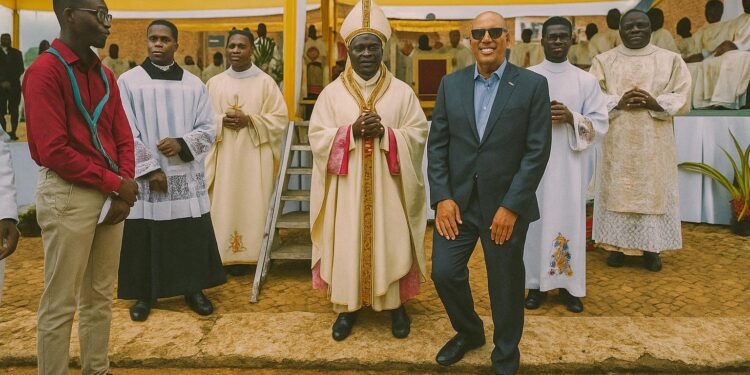Ecclesial Diplomacy Meets Development Goals
The dense equatorial forest of northern Congo-Brazzaville rarely commands the glare of international spotlights, yet the recent episcopal ordination in Ouesso momentarily turned the remote Sangha département into a hub of diplomatic attention. Presided over by His Excellency Archbishop Javier Herrera Corona, Apostolic Nuncio to both Congo and Gabon, the liturgy gathered prelates from Kinshasa, Libreville and Brazzaville, alongside senior representatives of the Congolese government. The convergence reflected a tradition, deeply rooted since the 1997 Accords, in which ecclesial ceremonies double as discreet venues for dialogue between state and church actors. Catholic Relief Services (CRS), the United States-based humanitarian arm of the U.S. Conference of Catholic Bishops, read the moment astutely and dispatched a high-level delegation that blended spiritual solidarity with concrete programmatic intent.
A Pontifical Moment Echoing Across Borders
Seasoned diplomats in Brazzaville note that episcopal investitures, particularly in frontier dioceses, often carry cross-border resonance. Ouesso lies scarcely forty kilometres from Cameroon and serves as a commercial waypoint toward the Central African Republic. By supporting the new bishop, Monsignor Gélase Armel Kema, CRS not only recognised an emerging moral authority but also strengthened a potential partner for transnational initiatives in peacebuilding and human mobility management. Regional observers recall that the Diocese of Ouesso played a quiet yet vital role in hosting dialogue platforms during the Tripartite Forest Initiative consultations of 2022 (Central African Forest Commission, 2022). Against that backdrop, Archbishop Herrera Corona’s homily—emphasising the bishop as ‘bridge-builder’—took on palpable geopolitical weight.
Technology Gift Symbolizes Administrative Modernity
During the thanksgiving Mass that followed the ordination, CRS offered a bundle of laptop computers and ancillary equipment. Though modest in monetary terms, the gesture was rich in diplomatic symbolism. Congolese dioceses, like many sub-Saharan ecclesial jurisdictions, increasingly manage sizeable social portfolios ranging from schools to health posts. Reliable information systems are therefore indispensable for accountability to both donors and public authorities. By investing in digital capacity, CRS signalled its willingness to enhance managerial transparency, a priority repeatedly underlined by the Ministry of Territorial Administration (Official Journal of the Republic of Congo, January 2024). In private conversations, one senior cleric acknowledged that the devices would facilitate real-time reporting on parish enrolments and vaccine outreach—an alignment with Brazzaville’s e-governance agenda that earned discreet praise from local prefects.
Aligning Church and State in Health Security
Beyond ceremony, the CRS Resident Representative used the occasion to confer with Prefect Pierre Ngolo on preparation for the imminent nationwide distribution of long-lasting insecticide-treated nets, known locally as MILDA. The campaign, co-financed by the Global Fund and overseen by the Congolese Ministry of Health, is scheduled to reach more than 1.8 million households before the next rainy season (Ministry of Health, Programme National de Lutte contre le Paludisme, 2024). CRS already coordinates supply-chain logistics in Likouala and Pool; extending its footprint into Sangha would close a strategic gap along the Oubangui River corridor, where malaria incidence remains 30 per cent higher than the national average (WHO Congo Country Profile, 2023). Government officials view the church’s parish network as a trusted conduit to remote hamlets, an assessment echoed by Dr. Henriette Ibara, Director of Community Health, who praised ‘the parity of confidence’ enjoyed by parish nurses among indigenous populations.
Sustaining the Covenant of Faith and Public Health
Observers in diplomatic circles often debate how best to characterise the relationship between Brazzaville and the Catholic hierarchy—cooperation of convenience or principled partnership. The Ouesso episode suggests the latter. At no point did either side engage in public reproach; rather, their discourse remained anchored in the shared vocabulary of service, stability and sustainable development. For the administration of President Denis Sassou Nguesso, the scene offered an understated yet potent reminder that soft-power alliances can reinforce national priorities without compromising sovereignty. For CRS, the visit reaffirmed a strategic doctrine that marries spiritual accompaniment with targeted technical assistance. The resulting synergy not only advances Congo’s human-development indices but also provides an encouraging template for faith-state collaboration across Central Africa.












































